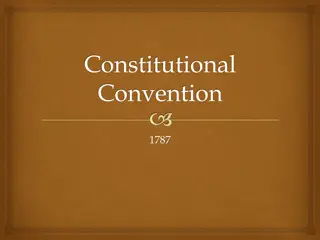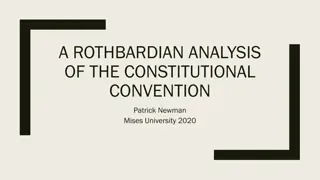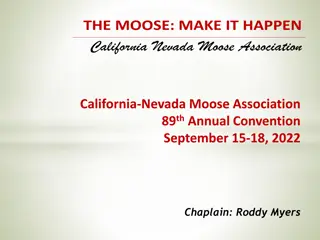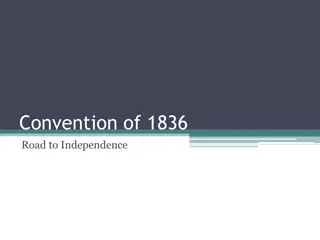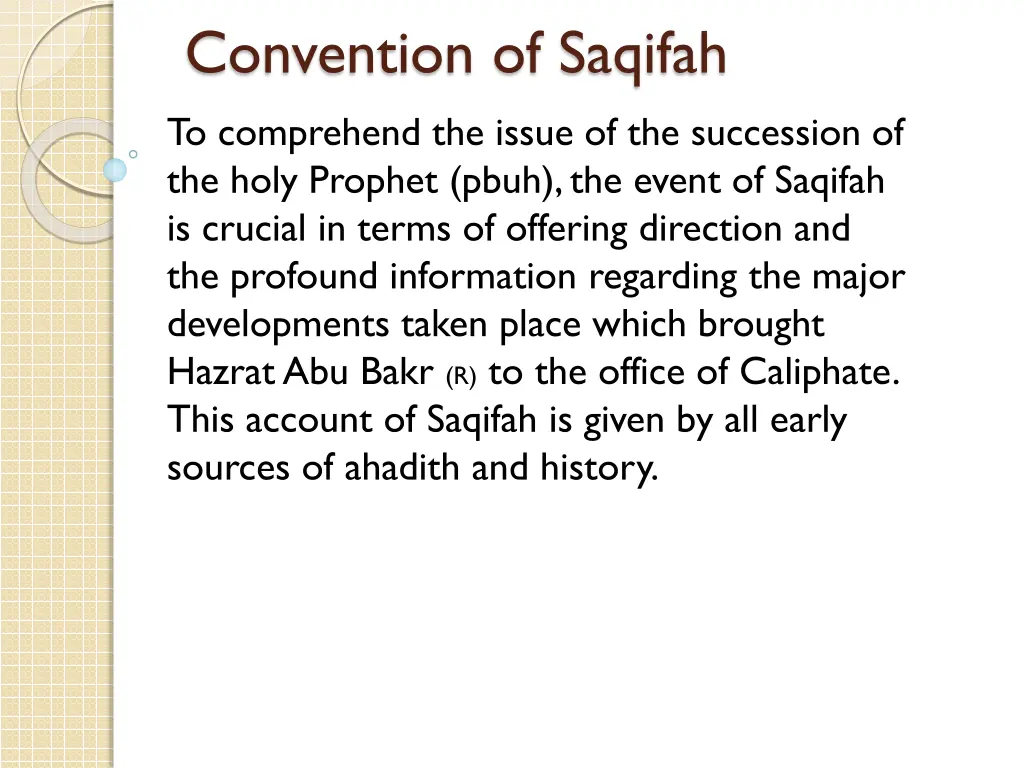
Saqifah: Key Event in Islamic History
The Convention of Saqifah played a pivotal role in determining the succession of the Holy Prophet (pbuh), leading to Hazrat Abu Bakr's Caliphate. Initiated by the Ansar, the meeting at Saqifah involved discussions between the Ansar and Muhajirun, ultimately resulting in the leadership being taken by Hazrat Abu Bakr. This historical event is documented in early sources of ahadith and history.
Download Presentation

Please find below an Image/Link to download the presentation.
The content on the website is provided AS IS for your information and personal use only. It may not be sold, licensed, or shared on other websites without obtaining consent from the author. If you encounter any issues during the download, it is possible that the publisher has removed the file from their server.
You are allowed to download the files provided on this website for personal or commercial use, subject to the condition that they are used lawfully. All files are the property of their respective owners.
The content on the website is provided AS IS for your information and personal use only. It may not be sold, licensed, or shared on other websites without obtaining consent from the author.
E N D
Presentation Transcript
Convention of Saqifah To comprehend the issue of the succession of the holy Prophet (pbuh), the event of Saqifah is crucial in terms of offering direction and the profound information regarding the major developments taken place which brought Hazrat Abu Bakr (R) to the office of Caliphate. This account of Saqifah is given by all early sources of ahadith and history.
Al Bukhari : Maktabh Bait ul afkar ud dowaliyyah page 1302 Hadith no: 6830 An ibne Abbas, 1377 Hadith No: 7219 An Anas bin Malik, Page no. 464 Hadith no: 2462 An Umar bin Khattab, Page no: 700 Hadith no: 3668 An Aisha , Page no: 1387 Hadith no: 7269 An Anas Masnad Imam Ahmed: Maktabh Bait ul afkar ud dowaliyyah page 56 Hadith no 391 Saheeh Ibne Hibban: Dar ul Ma;rfat Bairut first edition 2004 Page 229 Hadith no: 413 Seerah Ibn Hisham, Vol. 4 pp 183 to 185- Dar ul Kutub Al Ilmiyah Bairut 2000 At Tabaqat Ibn Sa d Vol. 3 pp 181 -182, Dar Sadir Bairut 1998 Tarikh Al- Yaqubi, Vol 2. pp 123-124, Dar Sadir Bairut 2010 Tarikh Al- Tabari, Vol 2. pp 234 236, Dar ul Kutub Al Ilmiyyah Bairut 2012 Al Kamil Fi Al- Tarikh ( Ibn Athir) Vol 2 pp 158- 162, Dar Al Hadith Cairo 2010
Convention of Saqifah According to the sources, the meeting of Saqifah was initiated by Ansar following the demise of the Holy Prophet. (saw).They had never invited any of the Muhajir community. They agreed on the leadership of Hazrat Sa,d Bin Ubadah belonged to al-Khazraj after the Prophet (saw). Knowing this, three Muhajirs sahabah Hazrat Abu Bakr, Hazrat Umar Bin Al- Khattab, and Hazrat Abu Ubedah Bin Al-Jarrah (RA) approached the meeting place al-Saqifah.
Convention of Saqifah There was a lengthy discussion and arguments between Hazrat Abu Bakr and Hazrat Umar (RA) from Muhajirun, and Hazrat Sa,d Bin Ubadah and hazrat Habab Bin Mundhir (RA) from Ansar over the issue of the eligibility of the office of Caliphate. Hazrat Sa,d s argument was based on the services of Ansar for the cause of Islam and helping the holy Prophet together with providing shelter and financial assistance to the Muhajirs at Madinah.
Convention of Saqifah While in return, Hazrat Abu Bakr and Hazrat Umar (RA) did affirm the claim and services of Ansar but refuted their argument on the basis of two major points; First, the early merit of Muhajirun in Islam and bearing hardships in this way, and second, their close relationship with the Holy Prophet saw).They further asserted that The Arabs would not accept the leadership after the holy Prophet except the tribe of the Holy Prophet (saw).
Convention of Saqifah However, they were opposed by Habab (RA) from Ansar and put forward the suggestion of two rulers from each side to settle the dispute. But the suggestion was strongly rejected by Hazrat Umar (RA) and this led to the heated arguments between Hazrat Umar and hazrat Habab (RA) but cleverly appeased by Hazrat Abu Bakr and Hazrat Abu Ubedah (RA)
Convention of Saqifah This meeting of Saqifah took a long time but without any result. During the process of arguments, Hazrat Abu Bakr (RA) also adduced a statement of the Holy Prophet (saw) that the leaders must be from the Quraish. According to the reports, when Bashir Bin Sa;d (cousin of Sa,d b. Ubadah) realised that Ansar were unanimous in electing Sa,d b. Ubadah, he decided to oppose him for he did not like the leadership of Sa,d. He addressed Ansar to withdraw their claim in favour of Muhajirun on the ground that they closely related to the holy Prophet and seniors in faith, and you should be contented with your services for Islam and helping the holy Prophet. A Sudden Development
Convention of Saqifah Since Bashir Bin Sa,d belonged to the Khazraj tribe, his words inspired not only the Muhajirs, but also paved the way for the other tribe Aws to change their minds and back the stance of the Muhajirun. So the leader of the Aws Usaid Bin Hudair al-Ashhali sided the words of Bashir which encouraged Hazrat Umar (RA)to immediately offer his Bayah (pledge of allegiance) to Hazrat Abu Bakr (RA), followed by Bashir b. Sa,d , Abu Ubedah b. Al-Jarrah and the members of Aws tribe. Seeing the situation, the attendees of al-Khazraj also performed their bayah on the hand of Hazrat Abu Bakr except their leader
Convention of Saqifah Sa d Bin Ubadah who refused to give his bayah and retained on the same view till his death. According to the sources, this was the initial phase of bayah, while it was completed on the next day in public in the mosque of the holy Prophet.
Convention of Saqifah The account is clear about Banu Hashim that none of them was present in Saqifah, nor were they invited to participate in the meeting. According to the reports, Banu Hashim gathered arounf Hazrat Ali Bin Abi Talib (RA) including Hazrat Zubair Bin Al-Awam (RA) and denied to accept the situation and the new leadership. According to the report of Ibn Qutaiba al-Dinawari, Hazrat Ali (RA) was taken to the new caliph Hazrat Abu Bakr (RA) who asked him about offering his bayah for him. In his argument, Hazrat Ali substantiated that Abu Bakr (RA) should offer the bayah for him because he has won the case of caliphate against Ansar on the ground of close relations with the Holy Prophet (saw).
Convention of Saqifah The Caliph Abu Bakr had never refuted the argument except by saying that he had already been elected and now withdrawal would lead to a huge chaos and division. (Ibn Qutaibah, Al-Imamah Wa al-Siyasah. Vol.1, p 19-20)
Convention of Saqifah Reports Also reveal that Hazrat Ali (RA) did not pledge his loyalty in the life of Sayyidah Fatimah (RA) and after her demise he pledged his loyalty to the caliph Hazrat Abu Bakr (RA) A report may be found about the prompt bayah on the same day Abu Bakr was elected, but viewed as weak by the scholars of history. Ibn Athir asserts that this narration is not reliable and has authenticated the other report denoting the six months after the demise of his wife. (Ibn Athir, Al-Kamil Fi al-Tarikh: vol.2, p 64)
Convention of Saqifah Ahlus-Sunnah unanimously believe the convention of Saqifah as legitimate and proper representative council to elect the leader of Ummah after the Holy Prophet (saw). This is on the ground that the Holy Prophet (saw) did not appoint anyone to succeed him to conduct the affairs of the Ummah. The Holy Prophet (saw) left the matter of choosing the ruler to his Ummah through the process of shura. The precedence of the meeting of Saqifah was the practical form of complying with the notion of al- shura.
Convention of Saqifah Ahl al-Sunnah also believe in the legitimacy of the leadership of Hazrat Abu Bakr (RA) together with the following four caliphs including Hazrat Imam al- Hassan (RA)
Convention of Saqifah The view of a renowned thinker, Muhammad S. El- Awa is worth quoting here. Regarding the meeting of Saqifah, it should not be forgotten that The Muslim gave precedence to the question of choosing the head of the state over other matters, including that of the burial of the holy Prophet. Meeting of Saqifah was a proper shura which after a lengthy discussion and arguments, elected Abu Bakr (RA) as the first caliph who was closest to the Prophet (saw) in behaviour and manners to head the state after him. ( El-Awa, On The Political System Of The Islamic State: p 34)














